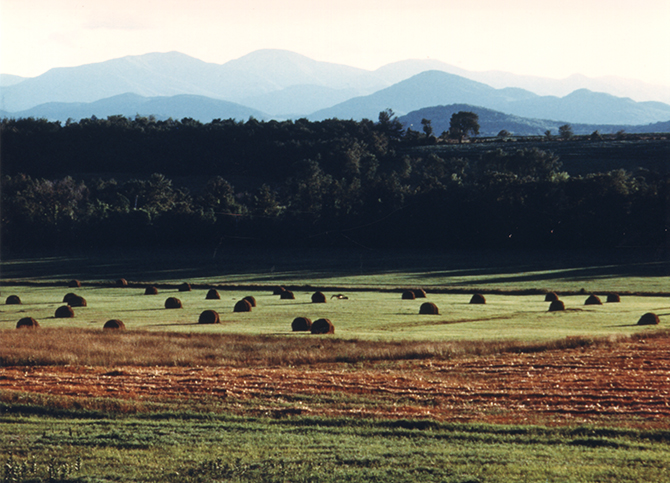
Resilient Farms, Resilient Communities: How agriculture can help the Adirondacks respond to climate change
By: Emily Liebelt - Adirondack Council Clarence Petty Intern

Fields of Essex
On the evening of August 29, I had the pleasure of attending Essex Farm Institute’s (EFI) first ever Public Forum at the Whallonsburgh Grange. With bellies full of sweet and savory crepes from the Northern Feast food truck parked outside, people of all ages filed into the historic building to listen to keynote speaker Anthony Flaccavento, President of SCALE (Sequestering Carbon, Accelerating Local Economies). The event was titled, “Resilient Farms, Resilient Communities,” and the issue at hand was how agriculture can help the Adirondacks respond to climate change. Flaccavento spoke enthusiastically to a large crowd of farmers, business people, and concerned residents. Flaccavento has been an organic produce farmer for the past 15 years during which time he also founded and directed Appalachian Sustainable Development. He is the author of “Healthy Food Systems: A Tool Kit for building Value Chains” and is a community activist studying how to fight climate change with bottom-up economies.
According to forum facilitator Curt Gervich, professor at SUNY Plattsburgh, experts in the field of climate studies are no longer using the word “prevent” when addressing issues related to rising temperatures and global climate change. Now, we are all going to have to use the word “adapt” since we have passed the point of being able to avoid harmful effects caused by greenhouse gas and CO2 emissions.
Residents of the Adirondack Park are realizing the changes caused by this air pollution, as recorded by local climate expert Raymond Johnson, Ph.D of Chazy. As the director of the Institute for Climate Studies, USA he has complied information on Adirondack weather and climate events throughout history. The data show that the Mirror Lake in Lake Placid is freezing two weeks later than it did in the past. It is interesting to note that this lake, at an elevation of 1,857 feet, has had almost the same response to climate change as Lake Champlain at 95 feet, which now has ice-in dates 14 days later than 190 years ago. According to Johnson, “We must also remember the record setting floods in Lake Champlain, May 2011, and Tropical Storm Irene, September 2011, which caused tremendous damage to property and infrastructure in Vermont, New York and elsewhere.” Severe and unpredictable weather is certain to pose threats to our farmers, people relying on nature’s cycles for their livelihood.
Kristen Kimball, farmer, author, and co-founder of EFI, described how the Essex County organic farming network may already be one step ahead of climate change. She explained how the community is a model of successful marketing, collaboration over competition, and innovative farming techniques that conserve natural resources and remove carbon from our atmosphere. It’s been proven here in Essex County and around the country that locally grown networks, of entrepreneurs, farmers, consumers and advocates, accelerate and deepen healthy economies. Their climate adaption strategy is to keep growing and maintaining the support between farms and between farmers and the community.
While the organic farmers comprise a small percent of all agricultural activity in the region, their movement is spreading and now some large scale commercial farmers are adopting practices shown to be softer on the land and better for the world. However, with or without impending climate challenges, a successful future requires building diverse, resilient economies at the local and regional level, based on local assets and better meeting local needs. The Adirondacks are already primed for this kind of progress because of the variety of landscapes such as wilderness, farmland, and unique towns that the region boasts. To demonstrate what happens when consumers opt out of local products and services, Flaccavento mentioned the downsides of concentrated capital in big box stores and corporations: lower wages, less money in the community, and even higher crime and lower birth weights of babies. To become more self-sufficient and avoid these threats, rural areas like the Adirondacks should focus on growing local “capital” and wealth, in food and farming and other natural resource-based economic sectors, which also rebuild ecological health.
Hot topics of discussion included sustainability, regionalism and reaching the “vaguely concerned, sporadically motivated” tier of consumers. One particular graph shown by Flaccavento showed how in 1960, Americans spent 2.7 times as much on food as they did on healthcare. Yet today, Americans spend twice as much on healthcare as they do on food. This switch represents a whole slew of societal problems, but hits home for those invested in growing and eating wholesome local food. After an extensive Q&A session and a loud round of applause, I would say EFI’s first public forum was a success, motivating and educating everyone in attendance.
|
|||





